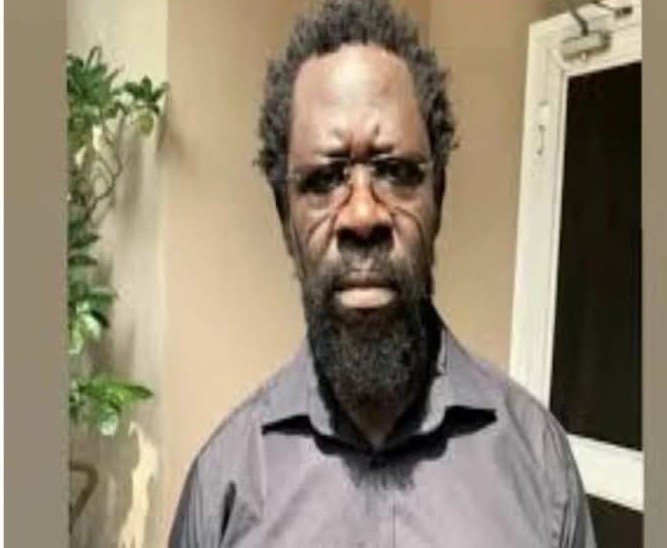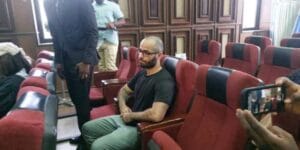Human rights lawyer and activist, Dele Farotimi, has clarified that he did not request anyone to plead with renowned legal practitioner, Afe Babalola (SAN).
Farotimi is currently facing trial in Ekiti State over a defamation lawsuit filed by Afe Babalola. The case revolves around claims made in Farotimi’s book, Nigeria and Its Criminal Justice System.
Recently, Peter Obi, the 2023 presidential candidate of the Labour Party and a close associate of Dele Farotimi, visited Afe Babalola. Speculations emerged suggesting that Obi’s visit was an attempt to appeal to Babalola on behalf of Farotimi.
However, during an interview with Inside Sources hosted by Laolu Akande, Farotimi’s lawyer, Temokun, addressed the matter. Temokun disclosed that during a recent prison visit, Farotimi denied asking Peter Obi or anyone else to approach Afe Babalola for a settlement.
Farotimi Denies Requesting Intervention
Temokun recounted his conversation with Farotimi on Friday, December 13, at the Ado-Ekiti Correctional Facility. He stated, “I visited Mr. Dele Farotimi in the correctional service yesterday afternoon. Recent events, including the visit by Mr. Peter Obi to Aare Afe Babalola and later to Mr. Dele Farotimi, have led to widespread speculation. People are unclear about the purpose of these visits and what is actually happening.”
He continued, “After Peter Obi left Ekiti, rumors spread about conditions for Farotimi’s release, including claims of an apology or potential compromises he might make to secure freedom. This uncertainty prompted me to visit him directly and clarify matters.”
Farotimi’s Stance on the Matter
Temokun explained that he posed several questions to Farotimi during their discussion, including:
- Peter Obi’s Visit: What does Farotimi know about Obi’s visit to Afe Babalola and its purpose?
- Messages to Key Figures: What message does Farotimi want to convey to Afe Babalola, the public, and his legal team?
In response, Farotimi reiterated his unwavering principles and philosophies, stating that it was unreasonable to assume he would ask anyone to intervene. Temokun quoted Farotimi: “If anyone who knows my history and values believes I would send someone to beg in a case involving my book, they are mistaken. The book has been published and widely circulated. I stand by my words.”
Farotimi emphasized that he remains steadfast in his beliefs and would not compromise his principles. He dismissed any notion of seeking an out-of-court settlement or apologizing to Afe Babalola.
“I am a man of conviction,” Farotimi reportedly told his lawyer. “I wrote that book to spark critical conversations about Nigeria’s justice system. I cannot, and will not, betray my values by pleading or negotiating on this matter.”
Background of the Defamation Suit
The defamation case stems from allegations made in Farotimi’s book, which critiques Nigeria’s legal and justice systems. Afe Babalola, a respected senior advocate, filed the lawsuit claiming the book contains defamatory statements about him.
Despite the ongoing trial, Farotimi remains resolute, asserting that his book reflects his genuine observations and experiences.
The involvement of Peter Obi in this controversy has raised eyebrows. His visit to Afe Babalola and subsequent meeting with Farotimi led many to speculate about his intentions. However, both Obi and Farotimi have denied claims that the visit was connected to any plea or negotiation.
The case has sparked significant public interest, with many expressing support for Farotimi’s stand against what they see as an unjust legal system. Others, however, have called for a peaceful resolution to avoid prolonged legal battles.
Farotimi’s Commitment to Justice
Through his legal team, Farotimi has reaffirmed his commitment to justice and transparency. He urges the public to focus on the larger issues highlighted in his book, such as the systemic flaws in Nigeria’s criminal justice system.
Temokun concluded, “Mr. Farotimi remains dedicated to advocating for justice, even in the face of challenges. His case is not just about him; it is about addressing the broader injustices in our society.”
Conclusion
Dele Farotimi’s defamation case continues to unfold, drawing attention to the intersection of activism, literature, and the legal system in Nigeria. As the trial progresses, one thing remains clear: Farotimi is determined to defend his principles and fight for the values he holds dear.





